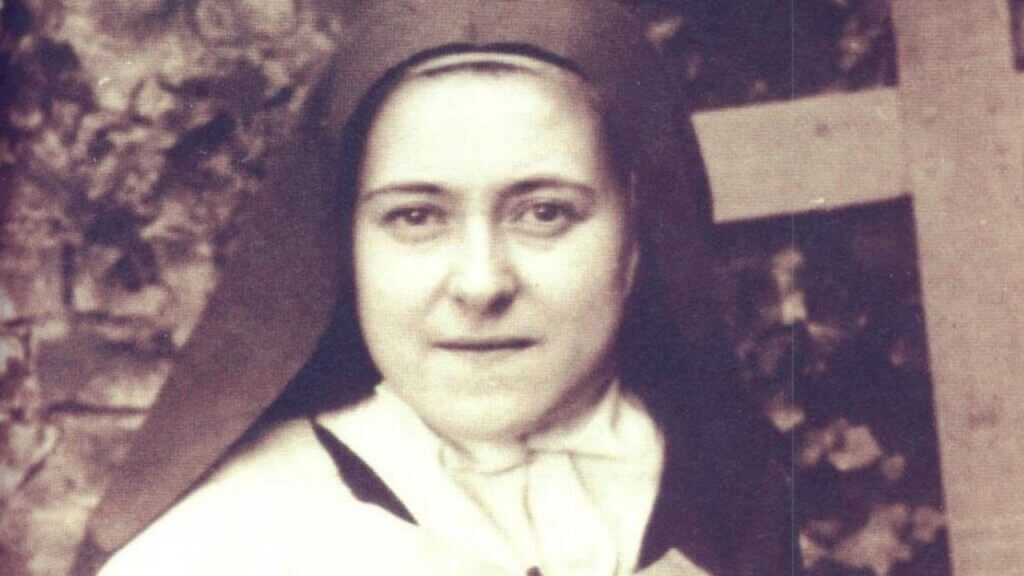
St. Therese is generally regarded as a cute saint. But there was much more to her as found in her writing and way of thinking that we can apply to our lives today.
St. Therese’s not-so-cute writing
In her autobiography, she wrote the types of things that might make adults quip, “Kids say the darndest things! Isn’t she adorable?”
Therese wrote that she desired to spend her time in heaven sending roses to people on earth. Cute.
She did happen to be a very cute little French girl, that’s true. But she also wrote with the boldness of someone who didn’t seem to care what anyone else thought. And if you take a few minutes to look past the flowery language, cute little Therese becomes kind of troubling.
“You are wrong to criticize this or that, to desire that everybody should adopt your view of things. Since we want to be little children, little children do not know what is best. Everything seems right to them.”
Hmm. That sweetness is starting to have a bite to it.
Or how about, “I know now that true charity consists in bearing all our neighbors’ defects – not being surprised at their weakness, but edified at their smallest virtues.”
How cute does that sound? If we’re being honest, that actually sounds really hard.
We can do this all day, and go to points of real severity: “Holiness does not consist in saying beautiful things, it does not even consist in thinking them, or in feeling them! It consists in suffering and in suffering everything. Holiness – it has to be conquered at the point of the sword. One has to suffer… one has to agonize!… ”
Where did the “Little Flower” go? Those statements sting like a sharp thorn!
St. Therese’s “Little Way”
Volumes have been written to try to explain what it is about this saint that makes her so intriguing and why she was made a Doctor of the Church.
She taught a path to holiness and happiness called the “Little Way” – doing small acts with great love, trusting that God as a Father would provide all that she lacked.
Following St. Therese’s Little Way means realizing we aren’t more than we are – we can no more provide for ourselves than small, dependent children.
But it also means realizing and trusting that our Father is good and loving and cares for us.
At the time, this was a new way to look at things. St. Therese grew up during a period in which people still thought they could earn their way into Heaven.
The battle between “faith and works” raged on, and the French Catholic position at the beginning of the 20th century had the flavor of ashy food and hair-shirts.
As a young girl, Therese was taught to count how many rosaries she said and somehow equated that to souls being saved.
But eventually Therese came to see that “In Your eyes all our justice is blemished.” From this line come innumerable insights that make up the rest of Therese’s work, and it’s this realization that is the antidote to the disease of self-love. (This might need some explaining – read on!)
Being human is unpredictable and scary
We live in a scary world. There are constant threats to our safety and happiness. It takes only a second to look around and see how many ways we can lose what we consider important.
The economy is terrible, our culture is not exactly seeking Truth, Beauty, or Goodness, and even if someone is happy, death or disease can strike at any time.
The human condition is a devastating one! It’s no wonder that good and honest people question the existence of a loving God in the midst of all this.
How do we typically overcome the darkness of our reality?
Some people ignore how bad it is and find comfort in temporary and passing pleasures. Most people develop the delusion from a very young age that “I can handle it.”
Ego-development means that the “I” becomes the strong center of our universe, and our happiness rests on ourselves. “I can do anything I set my mind to. I can overcome this obstacle. I can make it on my own.”
What small minds we have to imagine these statements are true! We have to limit ourselves to imagining only very small obstacles in order to hold onto the delusion that we can actually overcome them!
Finding strength when we feel powerless
It only takes a split second for the cold, hard reality to hit that we are, in fact, quite powerless. Disease and death, natural disasters, terrorism, job loss, or a thousand other adversities can hit that make us drop to our knees hoping there is something bigger and more powerful than us.
Cognitive dissonance is a fancy term for the discomfort that comes from trying to hold on to two opposing ideas at the same time.
We grow up feeling that we are in control of everything because some things go our way, and yet we get glimpses of just how little control we really have.
In order to avoid cognitive dissonance, we invent a different reality for ourselves – either by maintaining a false reality that we really are in control, or suffering the anxiety of feeling like everything is falling apart.
Why is it so hard to admit our smallness and helplessness?
When we need to ask for help, it means we can’t do it all ourselves. When we acknowledge Someone bigger than us, it means we didn’t do it all ourselves.
The fact is, we really aren’t all that good! As Therese wrote, “In Your eyes all our justice is blemished.” Even our absolute best is nothing compared to the goodness of God!
Does that mean we are doomed to a life of misery because we aren’t good enough?
No. Therese finished that statement with the prayer: “I wish, then, to be clothed in Your Own Justice and to receive from Your love the eternal possession of Yourself.”
Our justice is blemished, true. But God gives us His.
Through her “Little Way,” St. Therese helps us come to realize we aren’t more than we are. But it also means trusting that God is a good and loving Father who will care for us and provide for all that we need if we let Him.

You might also enjoy:
- Rehabilitating Our View of St. Therese of Lisieux (Podcast Episode)
- Why You Should Get to Know This Saint (Podcast Episode)
- Become Who You Are (Blog Post)
